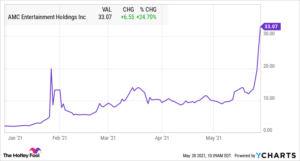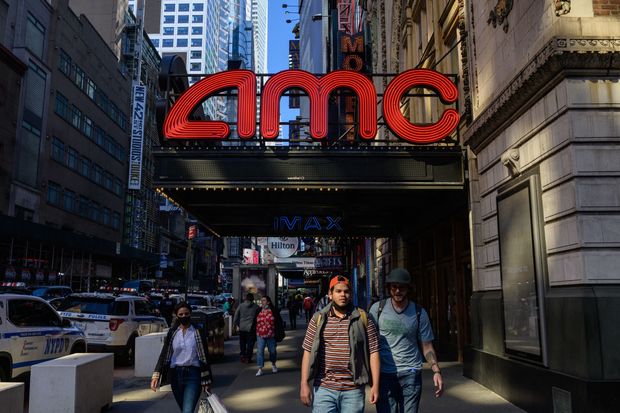AMC Entertainment’s skyrocketing stock price would be easy to dismiss as just meme-trade madness. The social media-fueled investor frenzy has launched the likes of Gamestop and Blackberry into unpredictable provinces.
But traditional investors may have missed a fundamental shift in the movie theater business—and it wouldn’t be the early time.
Shares of AMC surged 23% on Tuesday, shutting at $32.04—just off an all-time high of $36.72 set in late May. That lays the movie-theater chain’s market capitalization at roughly $16 billion, more than 15 times what it was in 2018. A record-breaking year at the box office. Shares were up another 34%, to $42.92, in premarket trading Wednesday.
Even if investors skipped an inflection point, though, the math doesn’t add up. The reason might be that the market cap isn’t the right measure. Maybe it’s enterprise value, which is almost market cap and debt. AMC’s enterprise value is about $26 billion, compared with $6.2 billion or so at the end of 2018.
AMC ENTERTAINMENT : ROCKET FIRE STOCKS

AMC added debt during the pandemic as theaters in the country’s largest cities were dark for months. And the numbers make it easy to comprehend why: The U.S. box office in 2020 generated about $2.1 billion in ticket sales, down 81% from the 2018 record of $11.9 billion.
So, it seems investors have been unsettled by movie theater economics. But it wouldn’t be the first time. The industry almost went belly up at the turn of the millennium. Regal Cinemas, for instance, declared bankruptcy in 2001.
Back then, the business had plenty of capacity because of a new theater design—stadium seating that gave a better view of the screen. That shift implied movie theater chains had to rebuild or risk losing all their customers to movie theaters that offered a better view. In the end, too many seats and not enough patrons meant the return on the stadium-seating investments never materialized.
The upshot was unification. With fewer operators, the number of screens stabilized. Between 2002 and 2007, Regal Cinemas became a cash-generating machine because the stock was mispriced. The stock returned 21% a year on normal.
In those days, Regal Cinema’s business value about $5 billion, or about 50% of total U.S. box office sales. That’s far short of AMC today. Something new has to be different for AMC to be worth it.
Maybe the movie theater business is going to go through another period of consolidation, which can guide in another golden age of returns. AMC’s Tuesday gains were catalyzed by new capital raised so the corporation could go on the offensive, acquiring defunct chains. Monopolies, after all, can be good for stock returns.


If AMC can increase market share and the U.S. box office sales can return to 2018 levels in a few years, total sales at might are $9 billion—$6 billion from tickets and $3 billion from concessions. Sales in 2018 amounted to $5.5 billion.
Then, with better gross profit leeways derived from a larger scale, AMC might be able to generate $600 million in free cash flow annually, which puts the stock at about a 4% free cash flow yield. The S&P 500 businesses for about a 3% free cash flow yield. The numbers can work—if they’re stretched.
There are difficulties with this strategy, though. There are lots of ifs and might—and AMC has never generated cash flow like that in the past. Coming at $600 million in free cash flow is more about justifying current valuations than foreseeing what is likely.
ACROSS THE US SOUTHERN STATES DEADLY WINTER STORM SWEEPS
There is also the difficulty of the peer stocks. They aren’t marketing like this is a brave new world for theaters. Cineworld stock is up 484% from its 52-week low, but shares are still off 72% from all-time highs. Cinemark shares are up 222% from their 52-week low. They are down 47% from their all-time high.

